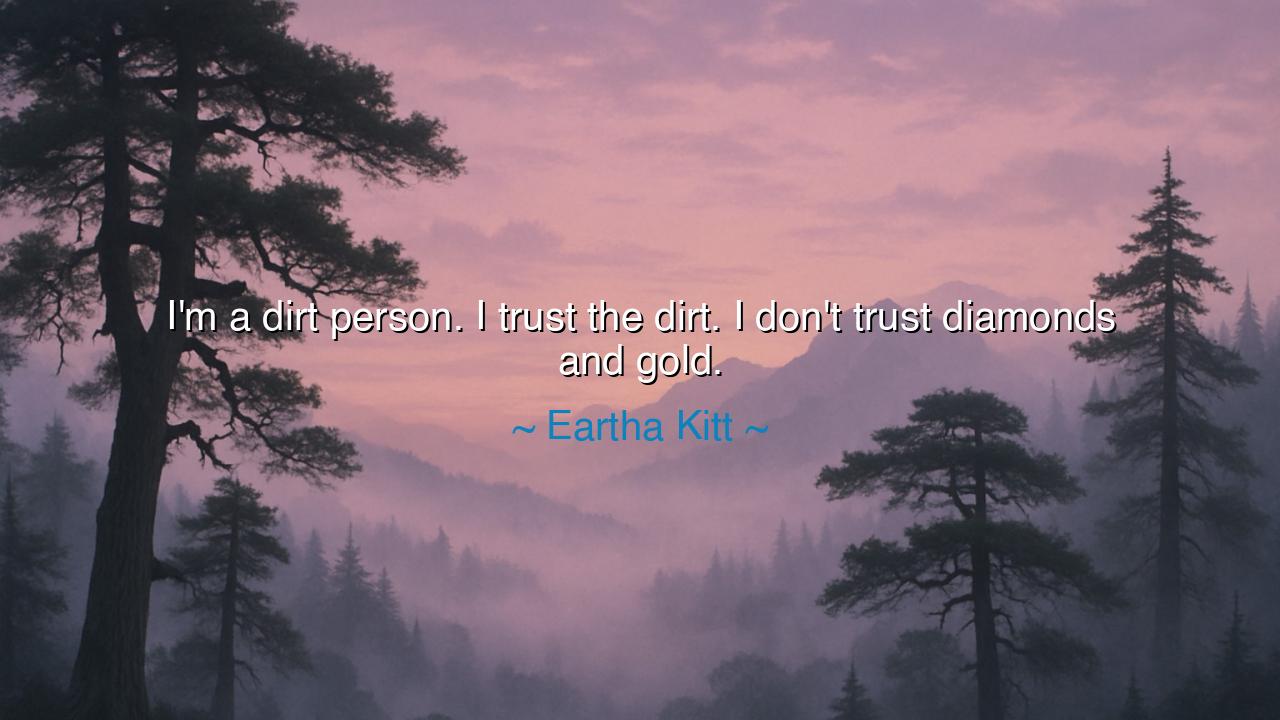
I'm a dirt person. I trust the dirt. I don't trust diamonds and






Eartha Kitt, the fierce and unyielding voice who rose from poverty to command the world’s stage, once declared: “I’m a dirt person. I trust the dirt. I don’t trust diamonds and gold.” These words, though simple, thunder with truth. For dirt is the ground beneath our feet, the foundation of all life, the place where seed becomes harvest, where man returns at the end of his days. It is constant, honest, and eternal. But diamonds and gold, though dazzling, are fleeting illusions of wealth and vanity, symbols of greed and corruption. In dirt is life; in jewels, often only deception.
The ancients knew this wisdom. Farmers were revered not because of splendor but because they worked with the earth, drawing sustenance from it with sweat and toil. In every culture, the soil was honored as mother — the Greeks called her Gaia, the Romans Tellus Mater, the Egyptians Geb. From dirt, empires rose, armies were fed, temples were built. The humble earth gave life, while jewels sat cold in vaults. Thus, Eartha Kitt’s declaration is an echo of ancient reverence: trust the soil that sustains you, not the glitter that blinds you.
History bears witness to this truth. Consider Mahatma Gandhi, who rejected diamonds, palaces, and riches, choosing instead the simple life of spinning his own cloth and walking barefoot upon the ground. He trusted the earth and the people who worked it, not the wealth of empire. In his humility and his embrace of simplicity, he wielded greater power than armies, shaking the British Empire to its core. His strength came not from gold, but from grounding himself in the eternal foundation of the common and the real.
By contrast, kingdoms that trusted in gold and jewels often collapsed under the weight of their illusions. The Spanish Empire, swollen with silver and gold from the New World, grew drunk on wealth. But the riches corrupted rather than sustained, and the empire decayed from within. Diamonds and gold proved to be treacherous companions — dazzling but unable to feed, clothe, or heal a nation. Eartha Kitt’s words stand as a warning: the glitter of wealth cannot replace the enduring power of the earth.
Children of tomorrow, hear this lesson: do not despise the humble. Do not overlook the soil from which you came. The dirt may stain your hands, but it is honest; it never lies. The jewels may shine, but they are indifferent to your hunger, your sorrow, your survival. Learn to love simplicity, to trust what endures, to anchor your life in what gives life rather than what merely sparkles.
The lesson is clear: seek your worth not in riches, but in truth. Value the honest labor of your hands above the fleeting possession of trinkets. Trust the foundations of life — the earth, the food it yields, the communities that rise from it — above the shallow brilliance of wealth. For in dirt there is life, while in jewels there is only vanity.
Practical action flows from this wisdom. Ground yourself in simplicity. Take time to touch the soil, to plant something that grows, to remember that life itself springs from the earth. Do not measure your worth by possessions, but by the truth of your character and the fruit of your labor. Trust those who are rooted in honesty, not those who dazzle with glittering lies.
So let it be remembered: “I’m a dirt person. I trust the dirt. I don’t trust diamonds and gold.” Eartha Kitt’s words are not merely personal, but universal — a call to return to what is real, to trust the foundation beneath our feet, and to build our lives upon it. For the earth endures, while all the jewels of the world will one day fade into dust.






AAdministratorAdministrator
Welcome, honored guests. Please leave a comment, we will respond soon